Bayern Munich beat Werder Bremen in a match between two teams with similar approaches. The following analysis will reveal the strategy of either side and how Bayern were able to win the game.
Team news
Werder Bremen deployed a 4-1-4-1 system. As Bargfrede is still missing due to injury, Sahin played as a single pivot in front of the established Bremen back four without any changes. In attack, Kohfeldt lined up youngster Johannes Eggestein and replaced Martin Harnik with Yuya Osako on the winger positions. The creative triangle of Werder was formed by Klaassen, M. Eggestein and striker Kruse.
Bayern Munich used a 4-2-3-1 formation with Goretzka and Kimmich as the double pivot. Niko Kovac only made one change in the starting line-up compared to their recent win over Benfica in the Champions League. Serge Gnabry replaced former Chelsea man Arjen Robben on the right wing.
Possession is everything!
It was not a coincidence that all goals were scored during a period of time where the scoring team dominated in possession. The strategy of both sides was to keep possession and thereby threaten the opposition goal. As Werder did not have many pacey players up front, retaining possession and progressing up the pitch was the more promising strategy than to simply counter attack.
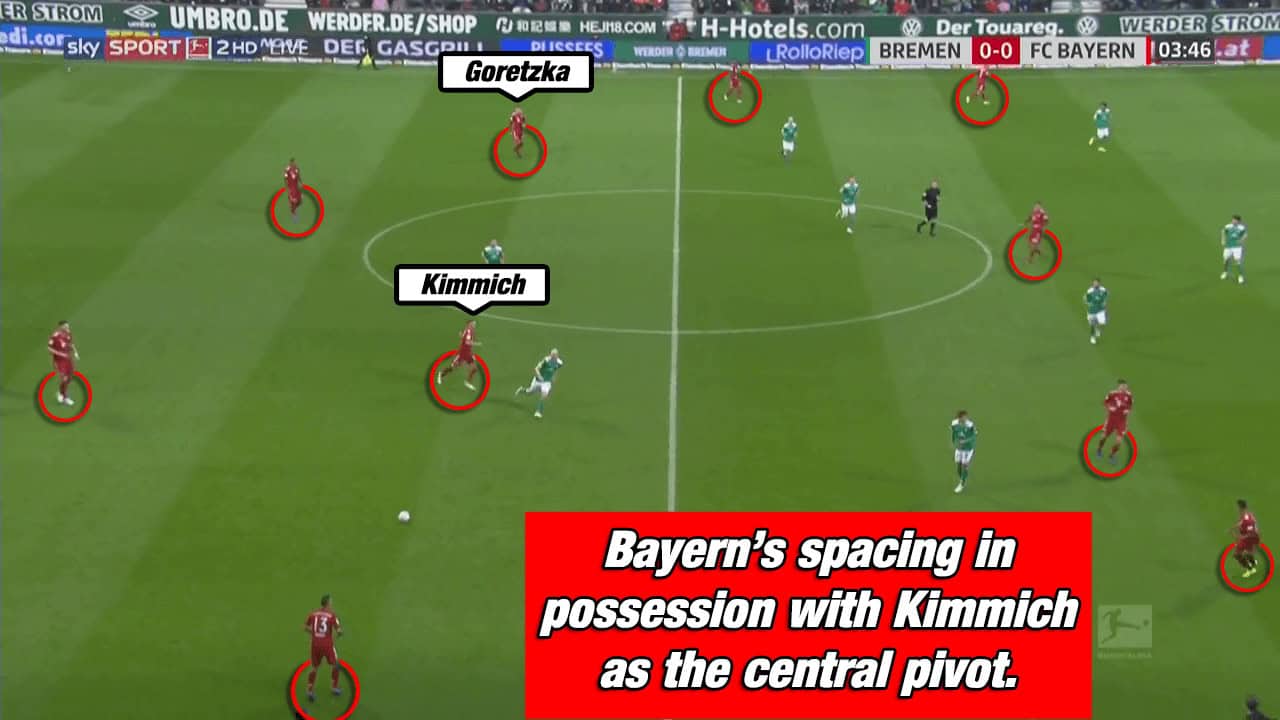
Bayern tried to circulate the ball with two deep-lying midfielders in Kimmich and Goretzka. Whereas Kimmich stayed centrally, Goretzka often dropped back into a left-back position allowing Alaba to move further up the pitch. This way, both central midfielders occupied the central midfield of the opposition which created space for Müller as well as wingers Ribéry and ex-Arsenal midfielder Gnabry between the lines.
To create goal scoring opportunities from open play, Werder Bremen created overloads on the wings. With their central midfielders and striker Kruse, Werder heavily shifted towards one side of the pitch. Only the winger and the full-back on the far side provided width on the other opposite flank.
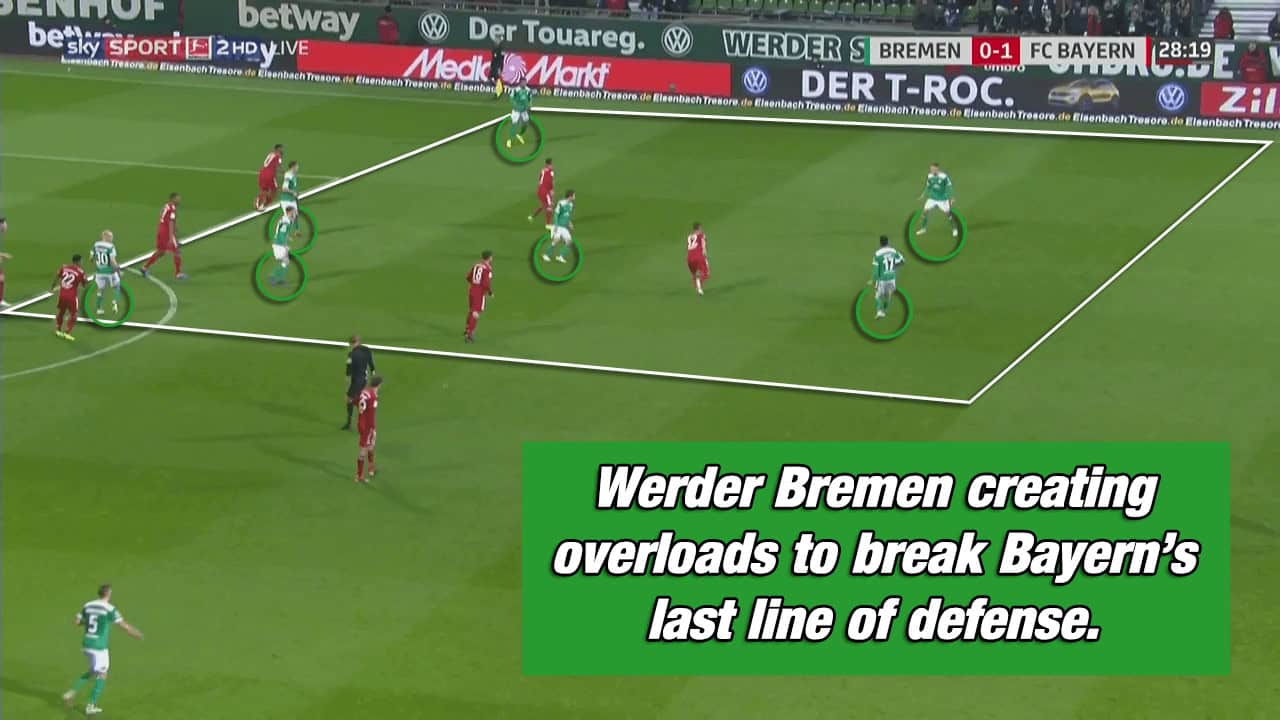
Bayern’s man-oriented press
The high press of Bayern was one of the key reasons why the side of Niko Kovac could dominate most parts of the match. Werder Bremen attempted to retain possession and thereby to progress up the pitch. However, Werder struggled to outplay the aggressive press of Bayern.
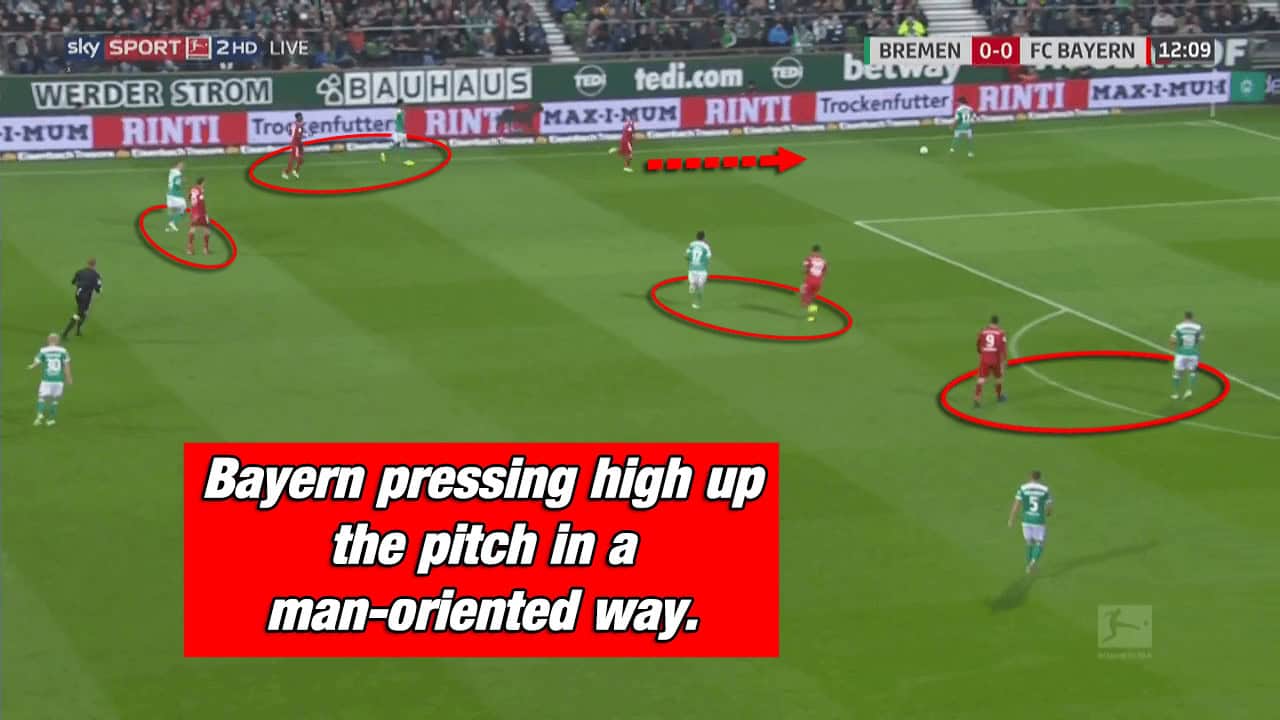
The German record champions used a man-oriented approach to prevent Werder from playing out. The three attacking players pressed the centre-backs of Bremen as well as single pivot Nuri Sahin. Müller man-marked Eggestein and Goretzka or Kimmich marked Klaassen. That way, Bayern still kept a spare man in midfield in case Max Kruse dropped back. The full-backs Rafinha or Alaba, as in the picture above, pressed the opposition full-backs in a very high position.
Werder with a low-block and counter-pressing
In their defensive phase, Werder set up a low-block in their 4-1-4-1 formation. Sahin, as the central defensive midfielder, should close down the space between the lines and help the full-backs to defend Bayern’s dangerous wingers.
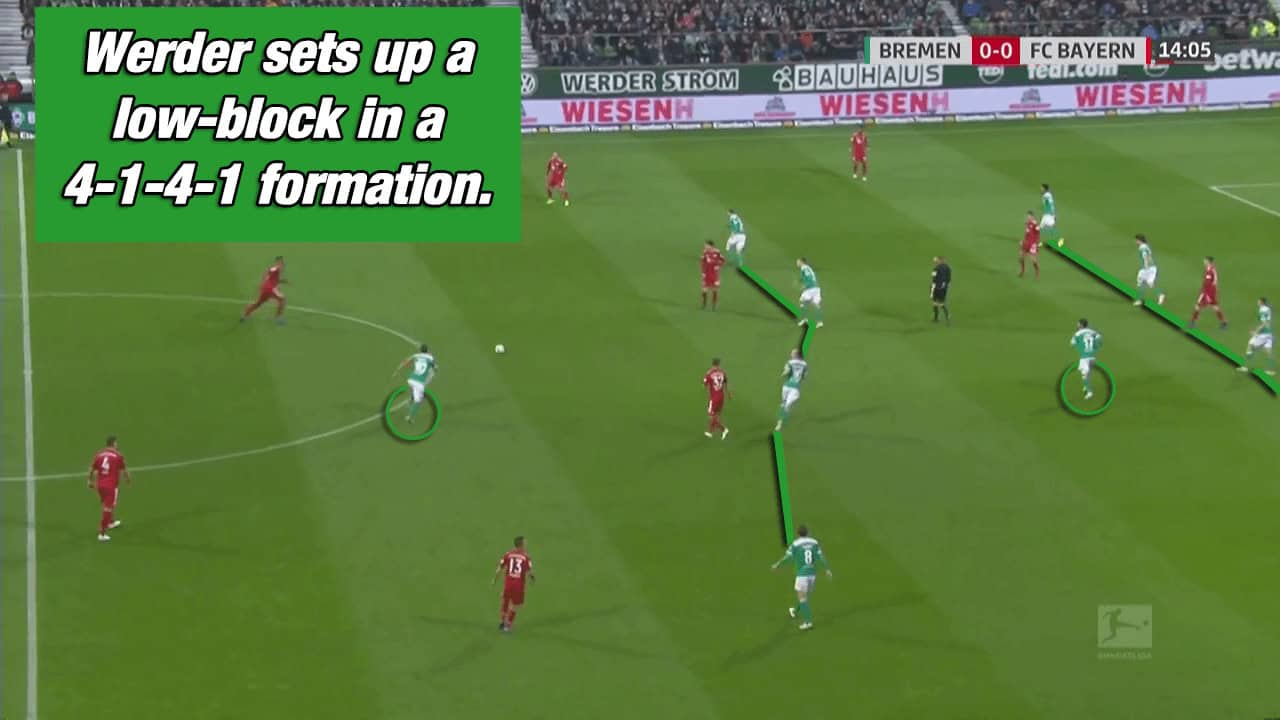
However, the home side struggled to press the central midfielders who therefore could pull the strings during Bayern’s possession phase.
Furthermore, to regain possession Werder attempted to counterpress Bayern in the opposition half. As Kohfeldt knew about Bayern’s strength in possession, the head-coach of Werder Bremen decided to attempt preventing Bayern from getting into their possession phase. Therefore Werder aggressively pressed Bayern in a man-oriented way which resembled Bayern’s press.
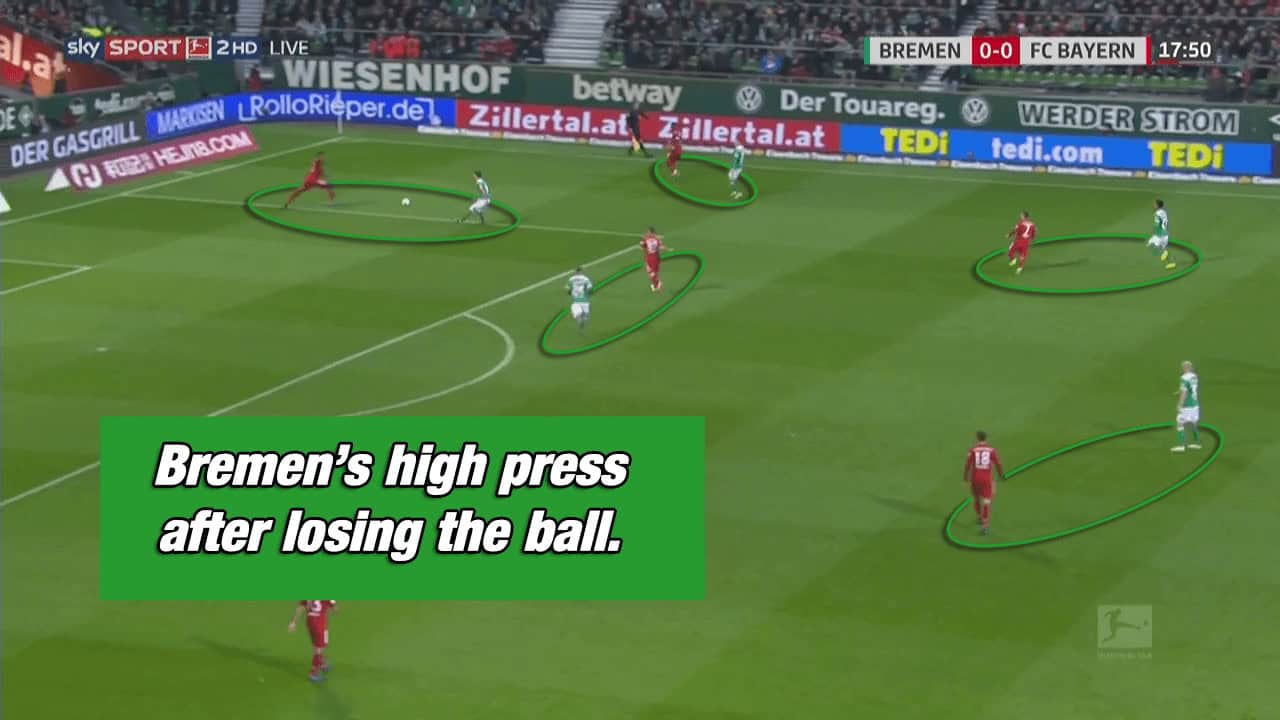
Especially in the end of the first half, Werder was able to regain possession through their Gegenpressing. This allowed Werder to dominate in possession for a short period of time.
Individual mistakes in defense
Errors in the defensive departments of both teams allowed the three goals of the match.
Werder’s back four struggled with the offensive trio of Bayern. Full-backs Augustinsson and Gebre Selassie were often positioned close to the opposition wingers which increased the gap to the central defense. Bayern used these gaps for either through passes or chips over the top of the last line. That way Munich scored the opening goal after a chip from Kimmich to Gnabry.
The equalizer of Werder resulted from another crucial defensive mistake. After a cross from Kruse, Boateng lost his aerial duel against the smaller Yuya Osako. Moreover, Manuel Neuer left his goal without being able to defend the ball. Thereby the goalkeeper even irritated his centre-back.
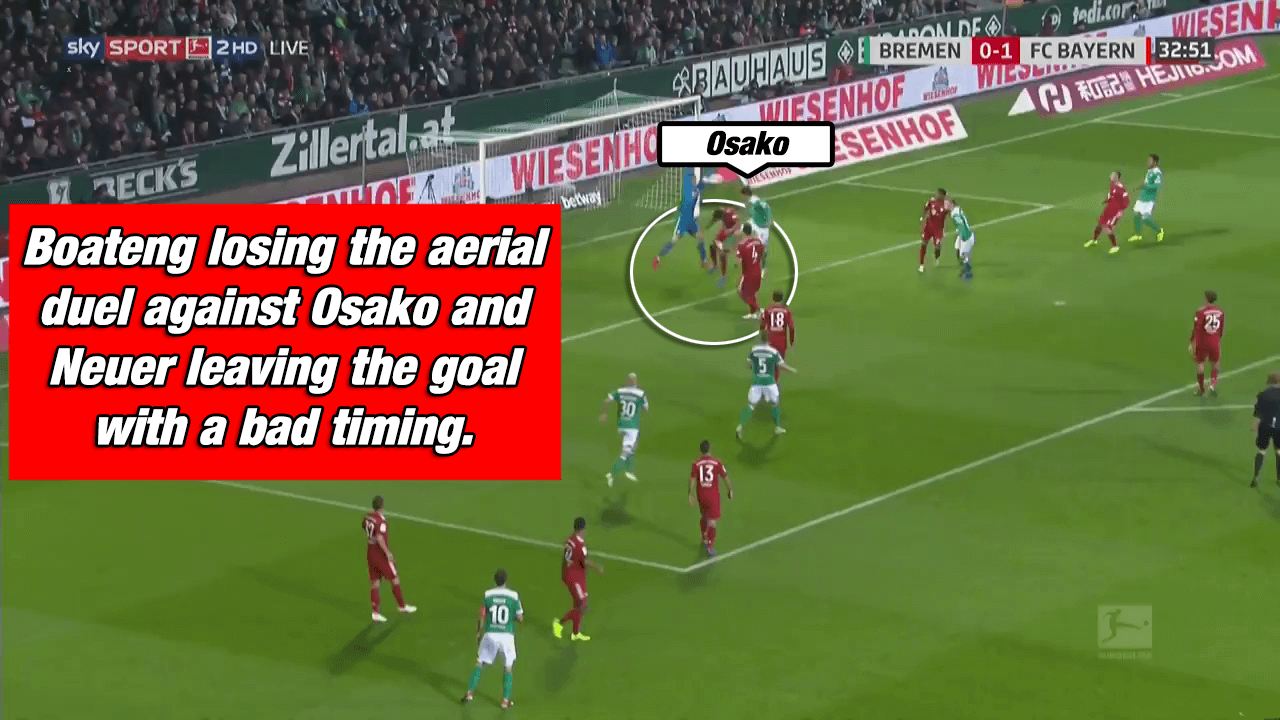
When former Werder player Gnabry scoredthe final goal of the match, Bremen seemed to be lacking organisation again. Sahin was not able to defend the dribbling of Thomas Müller. Instead of helping his team mate or defending the cross, left-back Augustinsson stayed in the cover-shadow of Sahin and was taken completely out of play due to his bad positioning. Furthermore, Moisander neither was able to mark Gnabry nor to defend the first post. This series of bad individual defensive errors led to Bayern’s winning goal.
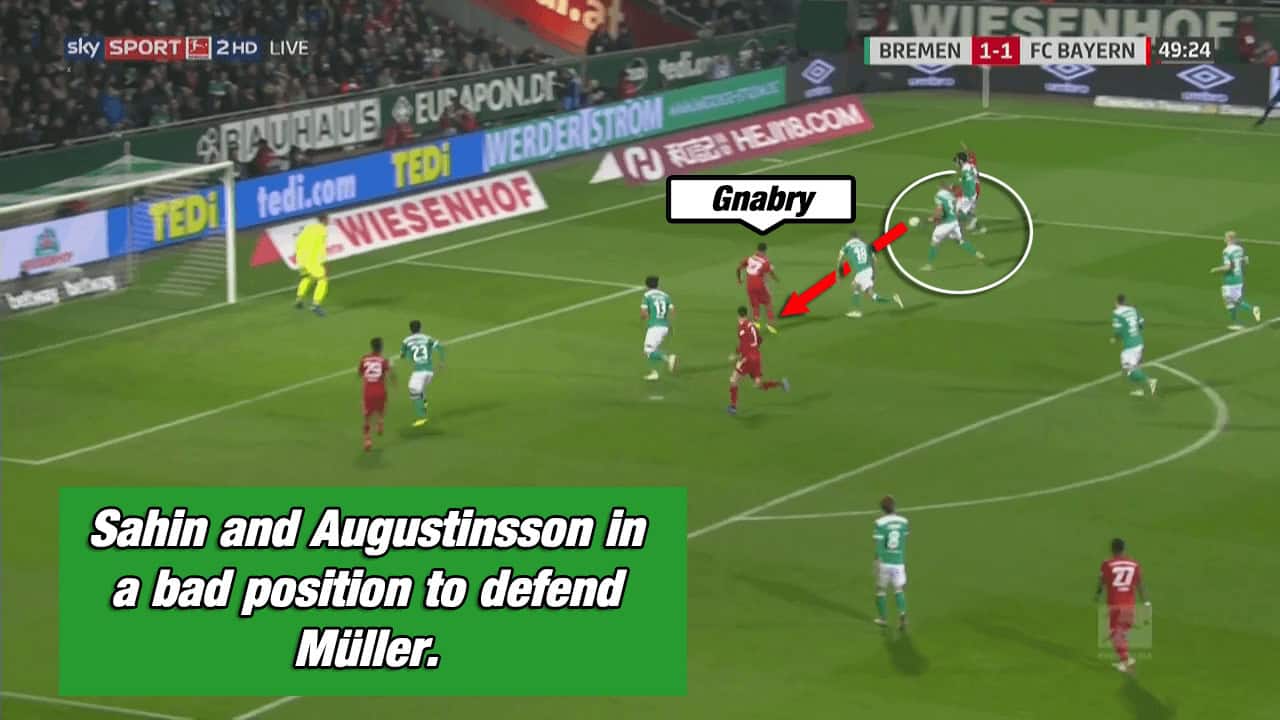
Conclusion
All in all, Bayern could dominate most parts of the match due to a higher possession rate. The focus on attacking through possession differentiated between Werder’s approach and the strategies of recent conquerors of Bayern Munich. Werder’s inability to counter-attack due to missing pace up front played into Bayern’s hands.
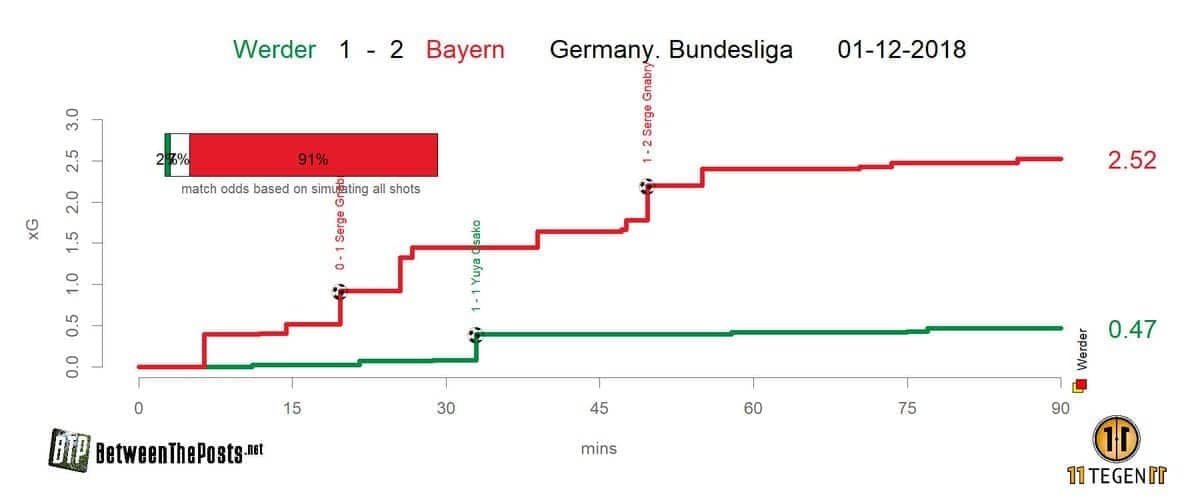
To conclude, Bremen’s defensive errors as well as Bayern’s dangerous combinations in the last third led to a deserved win for the reigning champion. However, the problems of Bayern do not seem to be fully solved.
If you love tactical analysis, then you’ll love the new magazine from totalfootballanalysis.com – 118 pages of pure tactical analysis covering topics from the Premier League, Serie A, La Liga, Bundesliga and many, many more. Get your copy today for just £4.99 here!




Comments